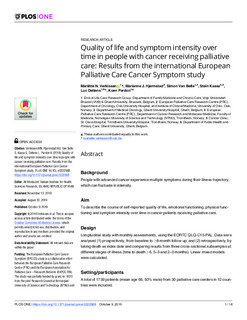| dc.contributor.author | Verkissen, Mariëtte N. | |
| dc.contributor.author | Hjermstad, Marianne Jensen | |
| dc.contributor.author | van Belle, Simon | |
| dc.contributor.author | Kaasa, Stein | |
| dc.contributor.author | Deliens, Luc | |
| dc.contributor.author | Pardon, Koen | |
| dc.date.accessioned | 2020-02-12T07:46:28Z | |
| dc.date.available | 2020-02-12T07:46:28Z | |
| dc.date.created | 2019-11-26T19:47:46Z | |
| dc.date.issued | 2019 | |
| dc.identifier.citation | PLOS ONE. 2019, 14:e022988 (10), 1-16. | nb_NO |
| dc.identifier.issn | 1932-6203 | |
| dc.identifier.uri | http://hdl.handle.net/11250/2641169 | |
| dc.description.abstract | Background
People with advanced cancer experience multiple symptoms during their illness trajectory, which can fluctuate in intensity.
Aim
To describe the course of self-reported quality of life, emotional functioning, physical functioning and symptom intensity over time in cancer patients receiving palliative care.
Design
Longitudinal study with monthly assessments, using the EORTC QLQ-C15-PAL. Data were analysed (1) prospectively, from baseline to ≥8-month follow-up; and (2) retrospectively, by taking death as index date and comparing results from three cross-sectional subsamples at different stages of illness (time to death ≥6, 5–3 and 2–0 months). Linear mixed models were calculated.
Setting/participants
A total of 1739 patients (mean age 66, 50% male) from 30 palliative care centers in 12 countries were included.
Results
In prospective analyses, quality of life, functioning and symptoms–except nausea/vomiting–remained generally stable over time. In retrospective analyses, patients 2–0 months before death reported significantly lower quality of life and physical functioning scores than those 5–3 months before death, who in turn scored lower than those ≥6 months before death, suggesting progressive decline. Emotional functioning remained initially unchanged, but decreased in the last months. Pain, fatigue and appetite loss showed a stable increase in intensity towards death. Dyspnea, insomnia and constipation increased from 5–3 to 2–0 months before death. Nausea/vomiting only increased when comparing those ≥6 months before death with those 2–0 months before death.
Conclusion
While the prospective approach showed predominantly stable patterns for quality of life, functioning and symptom severity throughout study duration, retrospective analyses indicated that deterioration was already apparent before the terminal phase and accelerated close to death. Our findings support the importance of early symptom identification and treatment in this population, and highlight the need for further studies to explore what characterizes those with either lower or higher symptom burden at different time points towards death. | nb_NO |
| dc.language.iso | eng | nb_NO |
| dc.publisher | PLOS, Public Library of Science | nb_NO |
| dc.rights | Navngivelse 4.0 Internasjonal | * |
| dc.rights.uri | http://creativecommons.org/licenses/by/4.0/deed.no | * |
| dc.title | Quality of life and symptom intensity over time in people with cancer receiving palliative care: Results from the international European Palliative Care Cancer Symptom study | nb_NO |
| dc.type | Journal article | nb_NO |
| dc.type | Peer reviewed | nb_NO |
| dc.description.version | publishedVersion | nb_NO |
| dc.source.pagenumber | 1-16 | nb_NO |
| dc.source.volume | 14:e022988 | nb_NO |
| dc.source.journal | PLOS ONE | nb_NO |
| dc.source.issue | 10 | nb_NO |
| dc.identifier.doi | 10.1371/journal.pone.0222988 | |
| dc.identifier.cristin | 1752771 | |
| dc.description.localcode | Copyright: © 2019 Verkissen et al. This is an open access article distributed under the terms of the Creative Commons Attribution License, which permits unrestricted use, distribution, and reproduction in any medium, provided the original author and source are credited. | nb_NO |
| cristin.unitcode | 1920,12,0,0 | |
| cristin.unitcode | 194,65,15,0 | |
| cristin.unitname | Kreftklinikken | |
| cristin.unitname | Institutt for klinisk og molekylær medisin | |
| cristin.ispublished | true | |
| cristin.fulltext | original | |
| cristin.qualitycode | 1 | |

